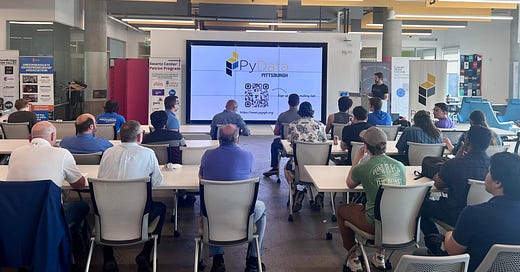Interpretable AI: A Night of Discovery at PyData Pittsburgh
(updated)
Last night, over 60 data scientists, ML engineers, and Python enthusiasts from across the region gathered at CMU's Swartz Center for an evening dedicated to unraveling the complexities of neural networks and their interpretability. Patrick Harrison and Dr. Rory Brenner led the discussions, providing unique insights into the current and future state of AI.
Patrick Harrison's Lightning Talk
Patrick Harrison, Principal AI Consultant at Data Theoretic, kicked off the session with a ‘bonus’ lightning talk. He discussed a novel method to improve the interpretability of AI language models like Claude by extracting monosemantic features—those with single, clear meanings—during training. This approach targets the "black box" issue prevalent in complex AI systems, aiming to make their outputs more transparent and understandable, particularly in sensitive sectors like healthcare and finance.
Dr. Rory Brenner's Presentation
Dr. Rory Brenner's talk, "Radically Improving Neural Networks with Insights from Modern Neuroscience," explored the intersection of AI and neuroscience. With a PhD in neuroscience from USC and a CS degree from CMU, he argued that drawing inspiration from the brain's architecture can dramatically enhance artificial neural networks.
The key highlight was "perforated backpropagation," a groundbreaking technique that incorporates artificial dendrites into neural network training. By mimicking the brain's information processing, this approach could revolutionize AI. Dr. Brenner supported his claims with case studies:
Drug Discovery: Applied to the Tox21 dataset, the technique reduced toxicity test error rates by 40%, potentially accelerating drug discovery.
Stock Forecasting: Using the CSI 300 dataset, the approach increased prediction precision by 4%, improving decision-making effectiveness by 30%.
Speech Processing: Incorporating the technique into the Wave2Vec model boosted its baseline accuracy from 98.3% to 99.1%, enabling more natural human-computer interaction.
The audience gained a new appreciation for the potential at the intersection of neuroscience and AI. Dr. Brenner's work highlights the power of interdisciplinary research and the exciting possibilities ahead as we unravel the mysteries of the human brain and apply those insights to develop more intelligent, efficient, and interpretable AI..
The Vision for PyData Pittsburgh
Explaining his vision for the group, Patrick Harrison, PyData Pittsburgh Organizer, notes:
“Pittsburgh has all of the building blocks required for a vibrant, accessible data science and machine learning community: leading research universities, outposts of major technology companies, dynamic robotics and autonomy startups, and many more organizations and individuals interested in the field. PyData Pittsburgh aims to connect these dots.”
‘Our monthly event series provides a space where experienced and aspiring data science and machine learning researchers, practitioners, and enthusiasts from all across the Pittsburgh region can find one another, share ideas, and learn from each other.”




